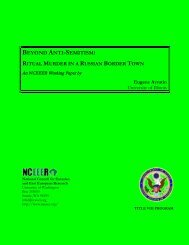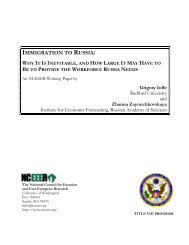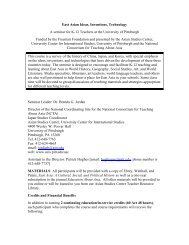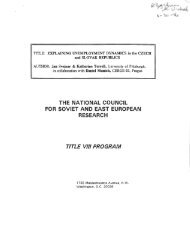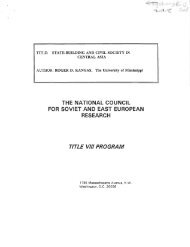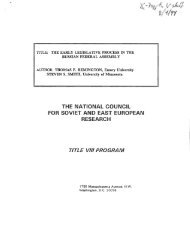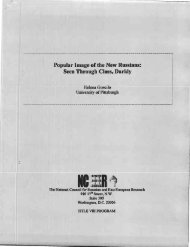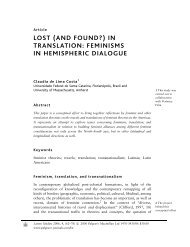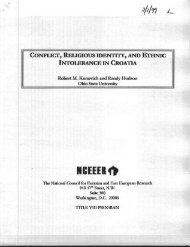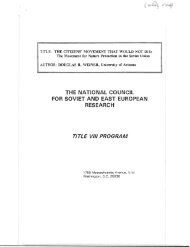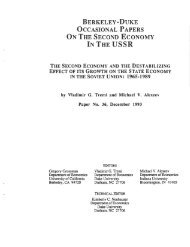The Russian Underground Economy in Transition - University ...
The Russian Underground Economy in Transition - University ...
The Russian Underground Economy in Transition - University ...
You also want an ePaper? Increase the reach of your titles
YUMPU automatically turns print PDFs into web optimized ePapers that Google loves.
Organized crime is not, of course, new to Russia. In many ways the traditional Sovie t<br />
nomenclature resembled an organized crime group, particularly with respect to illega l<br />
economic activities that took place <strong>in</strong> the USSR . (See the quote from Grossman's study i n<br />
section 2 .) <strong>The</strong> nomenclature used to hold a virtual monopoly on rent extraction from bot h<br />
legal and illegal sectors of the Soviet economy . <strong>The</strong> underground entrepreneurs usually had t o<br />
pay off government officials and law enforcement officers <strong>in</strong> order to stay <strong>in</strong> bus<strong>in</strong>ess . In thi s<br />
sense, the current situation is dist<strong>in</strong>guished by a higher degree of competition among th e<br />
crim<strong>in</strong>al groups and greater "disorganization" of the rent extract<strong>in</strong>g mechanism . 3 0<br />
Despite the chang<strong>in</strong>g nature of the <strong>Russian</strong> underground economy, it could be argued that<br />
the current situation is an improvement over the past <strong>in</strong> that a regulated market economy ,<br />
together with the underground economy, other th<strong>in</strong>gs be<strong>in</strong>g equal, would perform better than<br />
the traditional Soviet system together with its underground economy . While illegal economic<br />
activities exert essentially the same ambiguous <strong>in</strong>fluences on the rest of the economy, the mor e<br />
market-oriented nature of the legitimate economy should hold an advantage over centra l<br />
plann<strong>in</strong>g . 31 <strong>The</strong> net impact of the black markets on the <strong>Russian</strong> economy, however, probabl y<br />
has changed, on balance, from efficiency-enhanc<strong>in</strong>g under central plann<strong>in</strong>g to detrimenta l<br />
dur<strong>in</strong>g transition to markets . Presumably, even an excessively regulated market econom y<br />
would perform better if it is largely legal than if much of it is underground .<br />
What are the implications of the existence of the large <strong>Russian</strong> underground economy fo r<br />
evaluat<strong>in</strong>g the progress of market reforms and for the likelihood of their success? <strong>The</strong><br />
difficulties with measur<strong>in</strong>g illegal economic activities and <strong>in</strong>corporat<strong>in</strong>g them <strong>in</strong>to the system o f<br />
national accounts distort our perceptions of both the pre-reform and the current situation . If the<br />
<strong>Russian</strong> underground has been grow<strong>in</strong>g rapidly over the last several years, then the officia l<br />
data on economic growth underestimate the performance of the <strong>Russian</strong> economy . Such bias is<br />
particularly dangerous <strong>in</strong> the present volatile political situation . Perception of the economi c<br />
failure of reforms can easily become self-fulfill<strong>in</strong>g by, among other th<strong>in</strong>gs, weaken<strong>in</strong>g th e<br />
monetary system, further <strong>in</strong>creas<strong>in</strong>g uncerta<strong>in</strong>ty, and driv<strong>in</strong>g even more entrepreneur s<br />
underground. <strong>The</strong> perceived l<strong>in</strong>k between reforms and economic crime provokes calls fo r<br />
limit<strong>in</strong>g the freedom to engage <strong>in</strong> private economic activities and for other restrictions o n<br />
30<strong>The</strong> relatively disorganized nature of the organized crime currently is evident from government dat a<br />
<strong>in</strong>dicat<strong>in</strong>g that less than 1% of the 4000 "organized crim<strong>in</strong>al groups" <strong>in</strong> Russia consisted of more than 1 0<br />
<strong>in</strong>dividuals. More than half had only 2 or 3 members (Statistika sotsial'nykh anomalii, p. 19 . )<br />
31 I do not want to take this argument too far . For example, the Soviet state might have been much more<br />
efficient at extract<strong>in</strong>g rents from the underground economy while the contemporary mafia may do it <strong>in</strong> a<br />
wasteful manner.<br />
1 2




